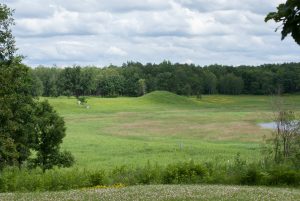Sites of Memory: Religion, Multiculturalism and the Demands of the Past (September 15-17, 2016) is a comparative workshop focused on how projects of national and religious public memory grapple with the “demands of the past” as they are experienced, ignored, and/or re-narrated by successive generations.

Manitou Mounds, Kay-Nah-Chi-Wah-Nung Historical Centre. Photo Kaleigh McLelland, 2016.
Orienting Questions
As we work to bring an international and intergenerational approach to examine how memory, place, and movement shape narratives of religion and multiculturalism, we invite you to consider four interrelated questions. Your essay need not directly address all of these questions, but they are here for you to consider:
- How are national histories of state violence and religious encounter remembered anew when later generations and newcomers confront them, and seek to understand and retell them?
- How do places, practices, protocols, material objects, and concepts carry the past within them, requiring new generations to reckon with them as sacralised, ritualized, and politicized sites of memory?
- What can we learn from comparative conversations that place these sites of memory in relation to specific national and religious narratives, including that of “multiculturalism” and “reconciliation”?
- How are histories of genocide and colonialism told differently as the terrain of religious conflict and solidarity shifts over time?